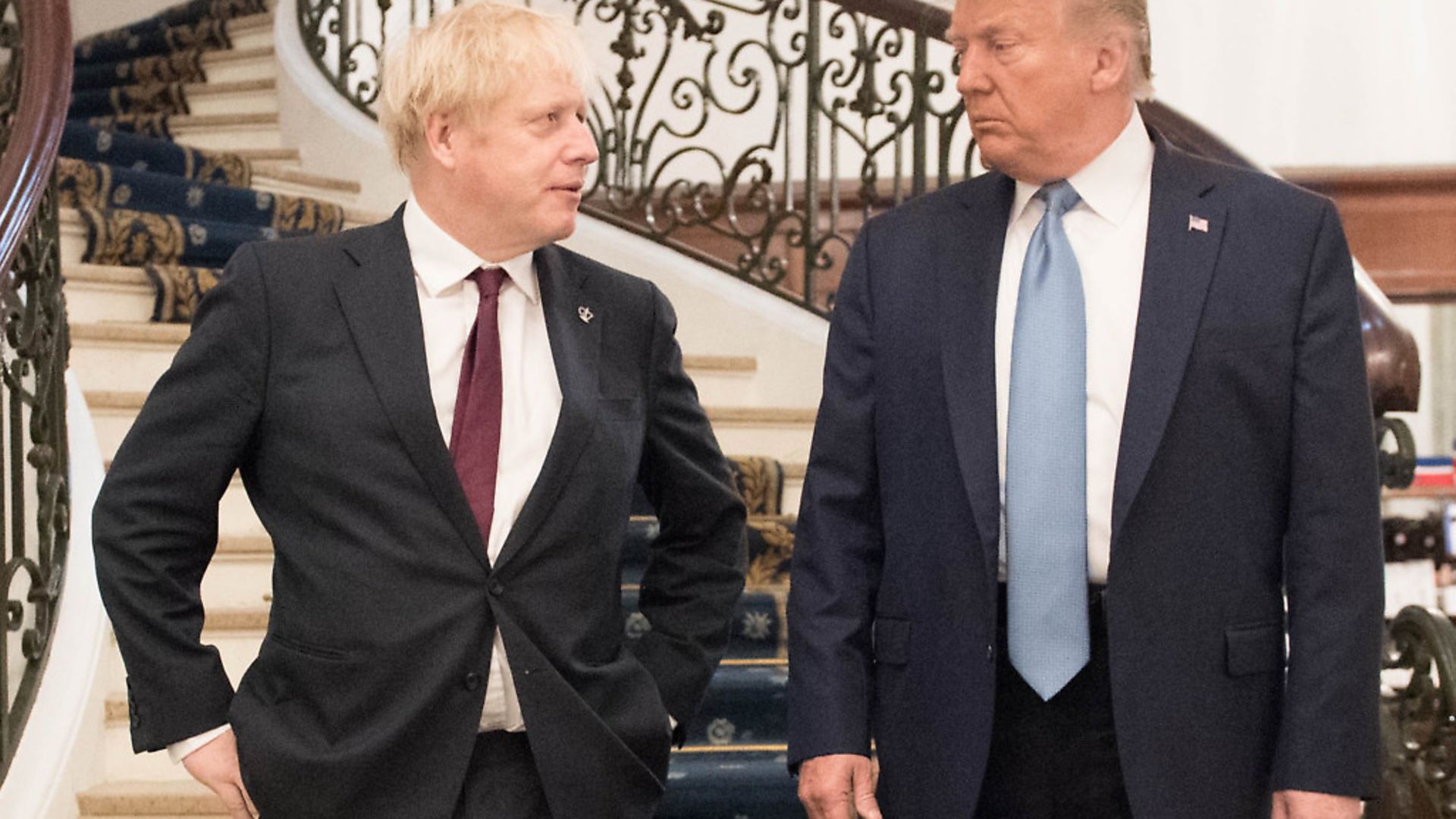
As they face inquiries, ZOE WILLIAMS looks at the twin-track approach being adopted by leaders on both sides of the Atlantic.

“I have always been a big champion of women,” Boris Johnson told the BBC this week. It is a peculiar formulation – in what role do we all, as a sex, need champions? As professionals? As wives and mothers (ew. Nauseating)? As human beings? But it’s also a recognisable statement, not in general but in particular, recalling one from Donald Trump: “I am the least racist person there is, anywhere in the world”.
Dense with significance, it hits all the same notes, but first, the context. It has to be rehearsed, not because we are in danger of forgetting it, merely for its extremity.
Trump came into public office with a specific and express agenda of discrimination against an entire religion – Islam – then went on to equivalise between Nazism and anti-fascism (“very fine people on both sides”) and incarcerated toddlers in unsanitary and sometimes deadly conditions, on the basis of their nationality.
Johnson, meanwhile, still under the shadow of a domestic altercation loud enough that the police were called, stands accused of groping women who happen to be sitting near him. He said the allegation is untrue, but this is his standard response to female challenge, “humbug”.

He either had an affair or IT training from Jennifer Arcuri – history is so far undecided – but he was certainly mayor when she received public funds and went on foreign trips, for which her firms were allegedly not eligible. (The only way to establish the truth of that initial ambiguity is to give him an IT exam; perhaps this could be part of the corruption investigation, as it gathers steam.)
On the basis of the prime minister’s sexual history, I couldn’t say whether he was sexist or not; maybe he loved women. Maybe he shagged around because he was only happy in their company. His new incarnation as the country’s leader, bludgeoning female MPs with his coarse disregard, minimising the threats to their lives, using the death of Jo Cox to preach a programme of ‘do as you’re told and you won’t get hurt’ has, along with the testimony of his would-be seduction targets (a constituency I imagine may grow), given the lie to his previous image, the jolly, consensual bumbler.
He has a woman problem. Trump has a race problem. Neither of their statements (“I have always been a big champion of women.” “I am the least racist person there is, anywhere in the world”) proved otherwise, because you cannot prove away actions with words.
But nor did either man intend to: rather, these were statements of impunity. To the critics, your arguments have no value here, your carefully marshalled evidence, your foundational principles of justice and reason, none of it is any good here in the land of “I say so”. And a different message, if anything, a more important one, to the base: Ha! Look at them, all up on their liberal dignity. When are they going to learn the world they’re in? If I’m the greatest champion of women/ the least racist person there is, it means sexism and racism, as concepts, as organising principles of behaviour, no longer exist.
When Donald Trump called Boris Johnson “Britain Trump”, did he catch on faster than the rest of us? Or did he give Johnson the idea? It has been astonishing, to see how cravenly the prime minister mimics the president’s playbook, warbling away with his bellicose, unplanned speeches, against a backdrop of men and women in uniform, as he did when he appeared at a police training college in Wakefield, West Yorkshire, last month.
There is nothing at all sophisticated in the imitation, no careful adaptation of American cultural symbols to their British equivalents. We have no tradition of looking at the boys in blue and yodelling at their bravery; they’re more likely to awaken a kind of comic, Dixon of Dock Green affection.
Indeed, the police themselves don’t really have a tradition of supplying this kind of imagery, and one poor trainee officer nearly passed out at the effort of keeping a straight face. But the playbook is not there to tap into deep cultural resonance; it’s there to tell you what you’re dealing with, the politics of unfettered authority.
There are four strands to their technique: the first is preemptive framing. Johnson’s obsession with prison sentencing is there to foreground the issue of knife-crime, which itself exists only to hold up Sadiq Khan as a diversionary target in any difficult conversation.
The prime minister’s performance on The Andrew Marr Show on Sunday was chilling for a range of reasons – one being the assertive lack of substance. Trying to find any actual statement, anything true, anything meaningful, anything that might enlighten us on the plan for the next two months, was like panning for gold in the River Wandle. You wouldn’t just not find gold; you could be wading through unspeakable murk forever.
But one interesting thing was how, in a difficult spot, he would land back on Khan; the current mayor should spend more on police officers than press officers; he should look to his own laurels. It was obscure, because it was so far from the point – they weren’t even talking about crime, they were talking about Jennifer Arcuri – except it wasn’t obscure at all.
He will preemptively attack the London mayor until we just get used to Sadiq Khan being a legitimate locus of ‘controversy’, whereupon Johnson’s preemptive frame will have become the frame (this, incidentally, was imported directly from Donald Trump, who hates the Muslim mayor of London with a vengeance nobody could possibly understand).
The second tactic is diversion, the well-worn ‘dead cat’ politics, large statements in which outrage and inanity vie to create the glorious technicolour.
The third is deflection, attacking the messenger to undermine the message, again with a side-order of dead cats. Trump, of course, has attacked so many messengers that there is barely an arm of state that hasn’t been fatally compromised, in his rhetoric.
Johnson is concentrating on the Supreme Court, not unreasonably, given that they are the major spanner in his works. But – he says more in sorrow than in anger – what a shame it is that they’ve made our centuries-old constitution unworkable, with their actions; now we’ll have to go the American route and appoint our judges politically, since the principle of judicial impartiality has died. Wait, what? He corrodes parliamentary sovereignty and it’s the judges’ fault? Never mind that now; the issue has been obscured; it is all about the characters involved.
Finally, the ‘trial balloon’ – find something truly absurd, that has never been part of our political calculations on any side, and say it often enough that it turns into a meaningful factor. For Trump, this was the nuclear capability; after decades of non-proliferation as a guiding principle, suddenly he wanted more nuclear weapons, and then he wanted to bomb hurricanes with them.
For Johnson, this is civil disorder, an entire populace ranged against its parliamentarians, erupting in riots, inconsolable until everyone agreed to do exactly what their messiah decreed. More cautious and pessimistic heads than mine are worried the true intent is to get us to a situation in which the government can use the emergency powers of the 2004 act to bulldoze legitimate dissent with the justification of this imaginary mob that they themselves raised.
I think it’s stupider than that: as stupid as a nuclear bomb in a weather event. Just a trial balloon to divert attention, with no more forward planning involved than a dog chasing a car.
The useful thing is that, when the patterns are so pronounced, it gives us the opportunity to learn from others existing in the same politics. What reins in the American president, and what just makes him stronger? What brought down the Austrian right? How are people organising against Bolsonaro, in Brazil , against Victor Orban, in Hungary? We can also see the parallels in their unravelling, as Trump’s lies catch up with him just as Johnson’s impossible promises hit their hard deadline. I’m not saying we can’t do this on our own,
I’m saying we don’t have to: there’s no careful architecture to Boris Johnson’s project, no intricacy. Ironically, he’s trying to run a campaign of hyper-nationalism with no Britishness; just your basic silverback, off-the-shelf, ten-a-penny, a strongman of nowhere.
Warning: Illegal string offset 'link_id' in /mnt/storage/stage/www/wp-includes/bookmark.php on line 357
Notice: Trying to get property 'link_id' of non-object in /mnt/storage/stage/www/wp-includes/bookmark.php on line 37







